Don't wanna be here? Send us removal request.
Text
Spirit Temple Retcons - Fire Lord/Throne
Azula says in Smoke and Shadow that she will never be Fire Lord and that she no longer wants to be Fire Lord, rather her destiny is to indirectly transform Zuko into a Fire Lord that is reflective of her:

However, Spirit Temple makes no mention of this scheme/destiny, and instead makes multiple references to Azula remaining a claimant to the throne, that it is owed to her, and that she will have it:

Note that Azula in the show says she, "Will be the greatest leader in Fire Nation History." Azula "never" being Fire Lord is either hyperbole, or requires Azula to abdicate her birthright. Even Iroh, who got "passed over" by Ozai's scheming, was still eligible for the throne. It seems Spirit Temple remembered that Azula's core identity can't just vanish in a puff of smoke.
104 notes
·
View notes
Text
Spirit Temple Retcons - Dad/Ozai
Smoke and Shadow has Azula uncharacteristically call her dad/father by his first name in this arguably jarring moment below:

Spirit Temple returns her to using "Father" and "Dad" as she did throughout the show:


Safe to say Spirit Temple backtracks on whatever Smoke and Shadow was trying to do with that.
#azula#avatar comics#azula in the spirit temple#avatar the last airbender#fire lord ozai#smoke and shadow
178 notes
·
View notes
Text
Azula's Cat Fight With Ty Lee
In Azula in the Spirit Temple, Azula thinks this is the real Ty Lee:

As expected, Azula's first reaction is to incinerate her enemy with the full force and fury of her firebending, right?
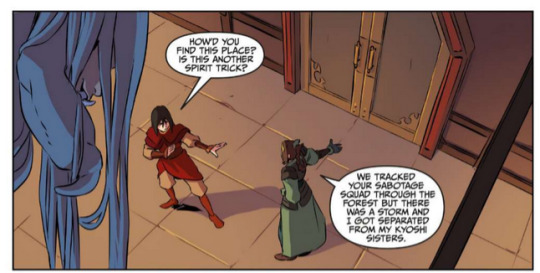
No, she just stands there in a halfhearted fighting stance, asking simple questions. Then she gives Ty Lee advice for Ty Lee's own good, and warns Ty Lee about the creepy monk, for Ty Lee's own safety:
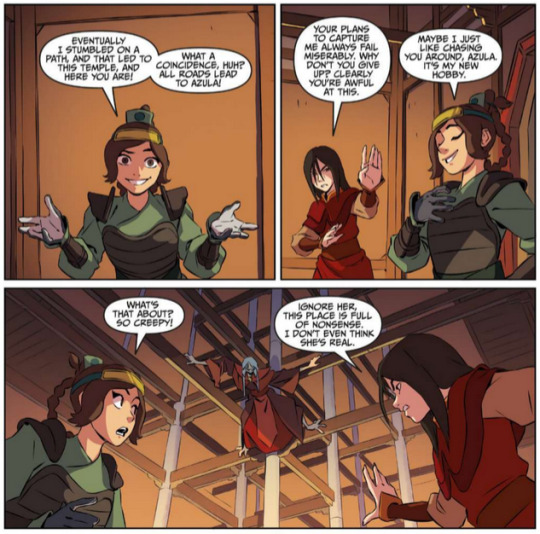
Then Azula demands Ty Lee pay attention to her so they can fight, rather than Azula just starting the fight herself:
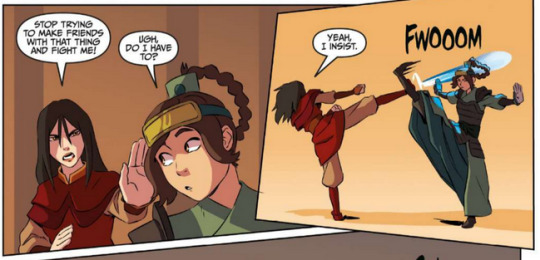
Azula makes halfhearted kicks and punches instead of her signature ranged firebending attacks, still not incinerating Ty Lee, and making catty remarks while doing so:
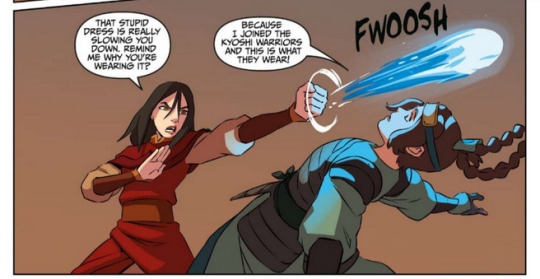
She goes hand-to-hand with Ty Lee, still not incinerating her, and makes yet more catty remarks:
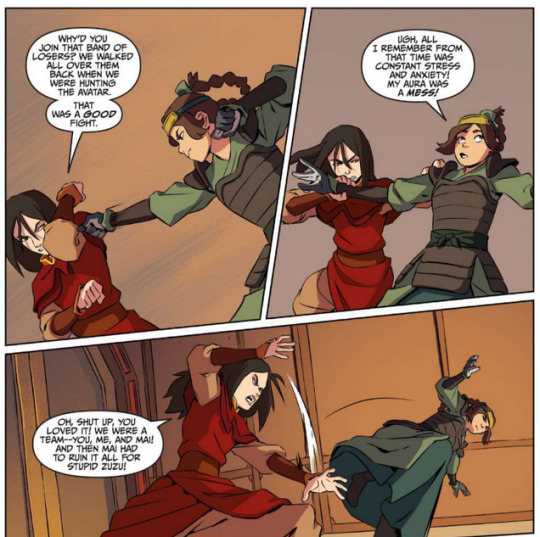
She even stops fighting for a moment to go on a monologue, not afraid of Ty Lee, the chi blocker, Ty Lee, the martial artist, Ty Lee, the traitor who is known to attack Azula while she is not paying attention:
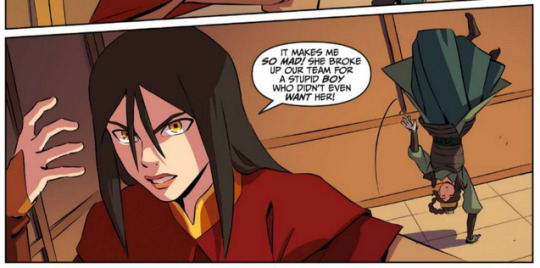
And when Ty Lee really pisses her off, she finally incinerates her with a fiery blast to the chest that burns through Ty Lee's armor and chars her to the bone. Right?
Lol, no. She just kicks her hard:
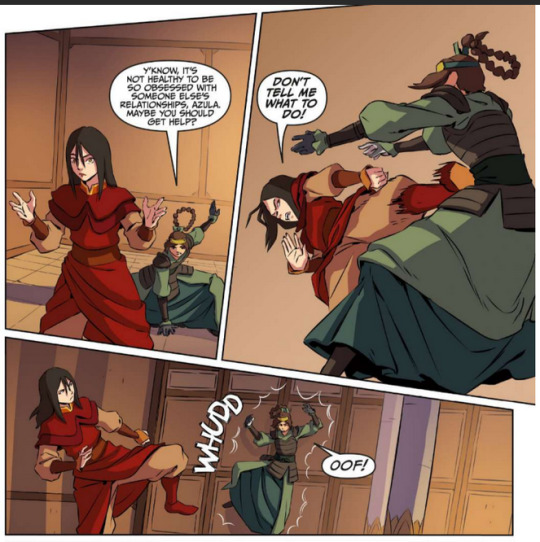
Then she ties up Ty Lee while she is unconscious and sits on the floor next to her, feeling bad:
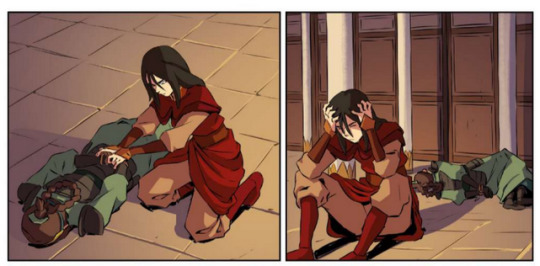
And when Ty Lee awakes, Azula cares an awful a lot about what a "loser" and "fan dancer" thinks about her:
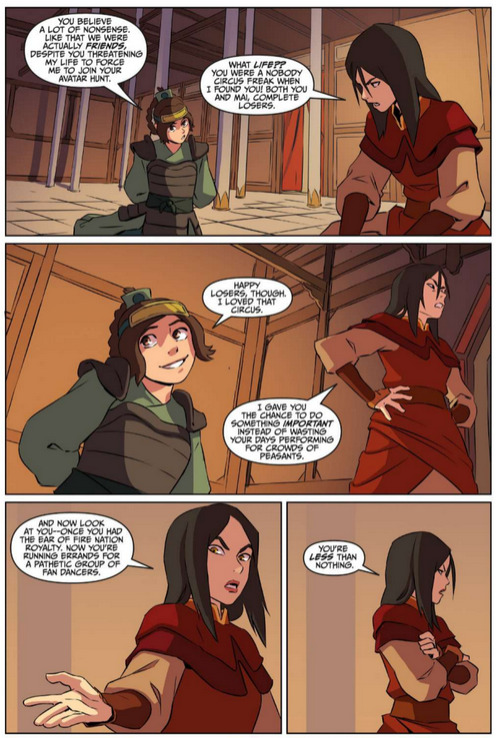
She even folds her arms across her chest, turns away, and pouts. No more fists, no more flames, no more fighting. The fighting didn't even help. It wasn't even a real fight. She's still mad and she wants Ty Lee to feel mad too.
No wonder Azula gives off angry wet cat vibes in this comic. She's acting like one.
But she'll be back later for her tuna, once she feels she has adequately punished her owners by denying them her presence for most of the day.
401 notes
·
View notes
Text
Who Cared for Azula?
And which of them did she hurt?
Some people will read this and think the answer is obvious. The answer is not obvious. Azula in the Spirit Temple contains a particularly puzzling scene that feels eerily out-of-place and concerns the titular subject: who cared for Azula, and which of them did she hurt? I’m referring to this scene:
Spoilers under the cut.
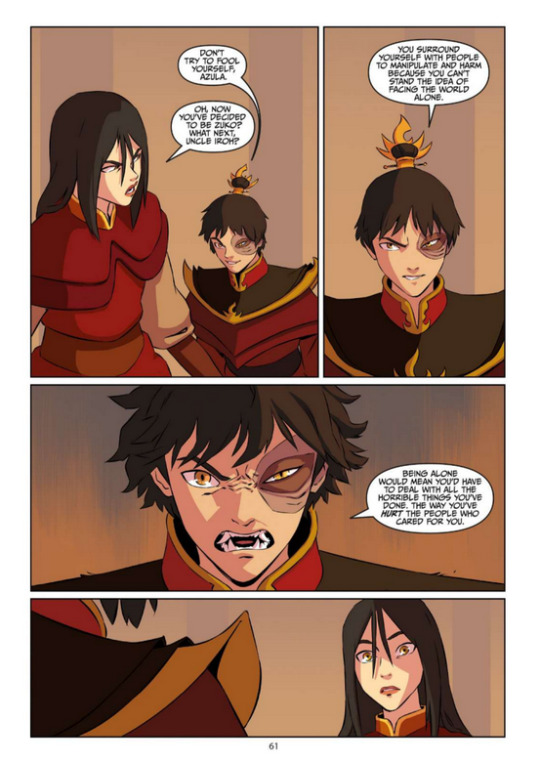
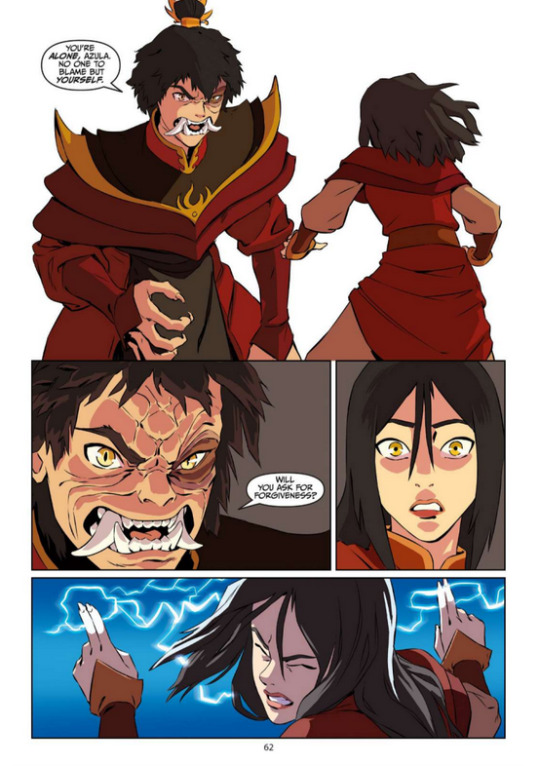
Who is the Zuko ghost referring to? Honestly ask yourself this: who cared for Azula, and of those people, which of them did she hurt?
Her mother?
Ursa more than likely loves, and at a minimum cares for, her daughter despite us never seeing Ursa act affectionate and snugly toward Azula as she does Zuko, but Azula never hurt her mom. She was a young kid when Ursa left. Is the ghost referring to The Search? Smoke & Shadow? Azula never mentions the face change, Kiyi, the Kemurikage, any of that. Those comics barely seem to exist for this comic.
No, not Ursa.
Her father?
I’d be hard-pressed to say that Ozai loves his daughter, but he definitely cares for her. But Azula didn’t hurt her father. Failing to prevent Zuko’s coup? Mentally falling apart in the biggest moment? Lying to him about Zuko killing the Avatar? Maybe? That can’t be what the Zuko ghost is referring to, but I can believe Azula feels guilt over the events of Sozin’s Comet and that she, in part, is responsible for his current sorry state.
Maybe her father.
Her uncle?
Iroh is not shown to “care” for his niece. Be cordial, polite, neutral, yes, but affectionate? Devoted? No way. Azula only hurts Iroh after he hurt the Fire Nation, as a traitor, as per her father’s orders. Azula did not hurt Iroh personally and Iroh did not care for Azula personally either. Iroh did, after all, fail to avenge Lu Ten’s death and abandoned the siege. That’s not Azula’s fault. Other people in the Fire Nation, and Earth Kingdom, dislike him too.
Definitely not Iroh.
Her brother?
Zuko is never shown to care for his sister. Let me make something clear: siblings do no tend to leave each other as they love their parents. Perhaps in an ideal world deep sibling love is the standard, but there’s a reason siblings terrorizing each other is a meme: they want all the parental attention for themselves. And this happens between Zuko and Azula. Zuko is bitter toward his sister, highly competitive, and harbors a massive inferiority complex. Zuko is never shown to be loving, affectionate, or personally devoted to her. In fact, Azula is shown displaying more evidence of sibling love than Zuko, but that is neither here nor there. Azula has hurt Zuko, yes, but Zuko did not care for her. Zuko is not someone who cared for Azula, and who Azula hurt. He’s primarily a rival whose weakness she didn’t care for.
Not Zuko.
Mai?
Mai cared for Azula? In what way? When is Mai shown being affectionate, loving, and personally devoted to Azula? When does Mai bring Gatorade and Campbell’s over to Azula when she is sick? Mai is as biting and sarcastic and nasty as Azula at times. And how exactly did Azula hurt Mai in such a way as to draw feelings of guilt from Azula? Azula helped bring Zuko home so Mai could get back together with him. Azula “freed” Mai from Mai’s parents and Omashu. How did Mai care for Azula outside of taking orders from her nation’s princess?
Not Mai.
Ty Lee?
Maybe. Did Ty Lee care for Azula? Did Ty Lee love Azula, feel affection and personal devotion to her? She hugged her in Return to Omashu and was excited to see her, but she turned down her “beloved friend’s” offer without a second thought. Did Ty Lee want Azula as a friend at that point, or was she upset Princess Azula knew of her and wished she had never known her? Azula definitely hurt Ty Lee at the circus, without a doubt. But did Ty Lee care for Azula? All we see is Ty Lee giving Azula lousy dating advice that did nothing to assuage Azula’s self-esteem issues. That’s love? That’s care?
Azula hurt Ty Lee, but did Ty Lee care for Azula? Maybe, but likely no.
Lo and Li?
Lo and Li said they were concerned for her well-being. Nobody else ever said anything like that to Azula throughout the show, nor any expanded content since. Yeah, they might have cared for her. Maybe they even loved her. I have a hard time saying Lo and Li were good for her, but it does seem they took a personal interest in Azula. And Azula banished them unfairly. She hurt them. And they appeared to care for her.
Yes, Lo and Li.
Her servants?
Her servants technically cared for her, cooking meals, doing laundry, her hair. They seemed shocked when Azula banished the girl holding the cherries. Perhaps some of them loved her, having known her for her whole life. I find it plausible Azula’s servants felt affection and personal devotion to Azula. And she hurt them. She unfairly banished them. They didn’t deserve it. And they cared for her.
Yes, her servants.
Her Imperial Firebenders?
Maybe? I assume they were mostly men and some women. I imagine at least some of those men were attracted to their princess, and I imagine some of those women were impressed by their princess’ firebending prowess. I can’t say they loved her or were affectionate, but they were certainly dutiful, at least duty-bound. And she banished them unfairly.
Yes, her Imperial Firebenders. They didn’t deserve it at least.
Her Dai Lee agents?
Screw the Dai Lee. They are scumbags. She was right to kick their sorry asses to the curb.
Who else? Her Fire Warriors?
How did she hurt them? She rescued them from the asylum!
The Zuko ghost confused me, and I find it interesting that it also confused Azula. Of all the dialogue in the comic, this felt the most unnatural, disturbing even, and Azula’s expressions during the encounter reflect that same feeling.

The Zuko ghost doesn’t sound like the rest of the comic. Azula had responses to all the ghosts until that point. The previous discussions concerned topics that felt natural to Azula’s perspective and experiences. The Zuko ghost don’t sound like it is expressing Azula’s self-loathing and creeping doubt the other ghosts conveyed.
To me, it sounds like it was speaking fandom talking points.
Grey Delisle, many years ago, said in an interview that she thinks Azula manipulates people into being her friends because she’s afraid people will leave her. The comic almost says this verbatim.
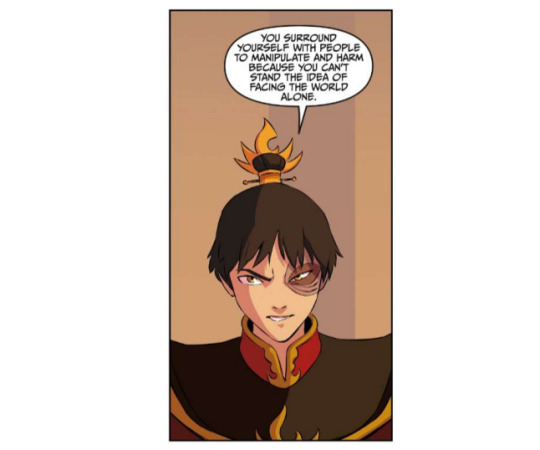
Certain fans believe that Azula took advantage of scores of people who were weaker than her, or dependent on her as would a petty toxic individual in an abusive interpersonal relationship, regardless of her station as princess. They, without question, cite Zuko, Mai, and Ty Lee as being the prime examples.
Of the three, Zuko is the only one she took advantage of for petty reasons, and primarily as a poorly-raised child. For Ty Lee, she gave her the medieval lord treatment to rip her from the smelly circus where platypus-bears lay eggs out in the open. Mai? I don’t see it. But the Zuko ghost is not talking about people she hurt in general. It’s talking about people who cared for her that she hurt.

Zuko has hurt Azula. Ty Lee has hurt Azula. Mai has especially hurt Azula. But did these people care for her? Did she betray their love they held for her?
I don’t think Zuko, Mai, or Ty Lee “cared” for Azula by the time the events of the show roll around. The Zuko ghost sounds like it is using fandom talking points from certain fans who hold the most pessimistic interpretations of Azula’s behavior.
I find it notable that Azula is drawn with a confused and disturbed expression while she is being confronted by the most off-sounding accusations. I also find it notable that the ghost delivering these accusations turns into a threatening monster. I also find it notable that she winds up killing this ghost.


Maybe it is a metaphor.
To answer the question, "Who cared for Azula, and which of them did she hurt?" It appears to be Lo and Li, her servants, and Imperial Firebenders. Maybe Ty Lee and maybe her father. But think of all the arguments over Azula and her interpersonal relationships. Does anyone care about Lo and Li getting banished? Her servants getting wrongfully accused of trying to assassinate her? Her Imperial Firebenders for being disloyal? Her father being in prison and debended at the hands of Zuko and his supporters?
Of course not, it's always Zuko, Mai, and Ty Lee, but the evidence that they "cared" for her is flimsy at best. The people who Azula should feel most guilty about hurting are the ones we, as fans, and the narrative, give the least amount of sympathy to.
355 notes
·
View notes
Text
My Problems With Azula In the Spirit Temple
Spirit Temple feels like a breath of fresh air in a lot of ways, but it also contains a number of lingering foul odors. Here are some of the problems I have with Spirit Temple:
This Version of Casual Bitch Face Azula
Not be confused with Resting Bitch Face Azula. I'm talking her eyebrows raised casually, her aloof expression, flippant demeanor, and very sharp, even jaundice features. I know we’ve seen variants of this Azula before, but this comic's version in the beginning and at the end feels like an amalgam of her characterizations from Book 2, Book 3, and The Search, maybe even Smoke & Shadow a bit. Something feels off about this characterization of Azula. It feels a bit forced and exaggerated.
The Fire Warriors Not Wanting Revenge on Society
Huge missed opportunity. This was an area where Azula and her acolytes could have related to each other and bonded on a personal level; being discarded by their society and their families. The potential was there for the Fire Warriors to be inspired by Azula because the princess of their nation went through the same ordeal as them. They even wore facsimiles of Azula’s clothes. Instead, they want to be Robin Hoods? The fuck? I know why the story did this. It wants to end the Kemurikage plotline and tie Azula to a new, likely comic-erased, plot for Avatar Studios. It’s still a monumental missed opportunity made even worse by the ending.
The Ending
Trash ending. I’ve changed my mind. It’s terrible. It almost sinks the whole comic. Almost, but not quite. One of two outcomes could have occurred for this story: Azula reconciles with the Fire Warriors, or Azula leaves them be, which is what happened. But we needed a more definitive statement from Azula, not Casual Bitch Face Azula flippantly walking off into the sunset. Once again, Azula is walking off alone into a forest, with no clear indication of what will come next for her or what she actually wants.
But the worst part of the ending is her line, “I’ll find new followers, a new place to rule." What complete nonsense. What, is she going to Neverland to rule over the Lost Boys? Skull Island and marry King Kong? This is 100% a result of Avatar Studios' and the franchise’s overall lack of plan surrounding Azula and the Royal Family. Don’t give me this amateur fanfic garbage of her venturing around the world with no money and no allies. The more I look at this ending, the worse it gets.
The Fire Warriors Getting Dropped
This ties into the ending. The franchise has a massive problem of not having people for Azula to talk to, not having anyone in her corner like Iroh was for Zuko. She’s alone in the finale. She’s alone in The Search. Smoke & Shadow is a joke so ignore that crap. And this comic continues the trend.
Being alone is not naturally part of her arc at this point. It's artificial. There should be no shortage of people in the Fire Nation who are willing to befriend the princess, help the princess, woo the princess. The Fire Warriors were clear examples of girls who would admire her, but the franchise chose to turn them into “good” people who just want to steal from the rich and give to the poor. Perhaps the problem is that Azula's allies would be political in nature and the Fire Nation currently lacks the necessary worldbuilding to have political allies for Azula when that would create huge downstream affects for Zuko.
The War Is Not Mentioned
Azula can’t separate her identity with her political role in the Fire Nation, and that's fine, but the franchise needs to be honest about why the Royal Family is so fucked up, why Zuko and Azula fought an Agni Kai, and why Azula is still adversarial to her older brother, because of the war.
The war.
The war. The war. The war.
The war that wiped out the Air Nomads and Southern Water Tribe waterbenders. The war that led Azulon to be an evil sack of shit to his grandson by commanding Ozai to kill him. That war that led Iroh to either be a proud warlord and favorite of said sack of shit Azulon or feckless burnout in the face of his sack-of-shit-to-be brother. The war that led Ozai to have a reason to be brutal and self-serving. The war that led Iroh to convince Zuko to battle his sister and prevent her from being Fire Lord. The war that pinned Zuko and Azula against each other in the first place.
The war, Sozin, and Azulon need to start getting blamed as root causes for a lot of these problems. Ozai is already getting his portion and is starting to get more from Azula. And Iroh doesn’t get off the hook. He failed to challenge his brother to an Agni Kai when clearly any member of the Royal Family can do so according to Zuko's and Azula’s Agni Kai. I need the war to be blamed for destroying the royal family. This comic barely does that.
Azula Was Too Complacent Around the Spirit
We all know Azula is an incredibly brave girl, but she’s also intelligent enough to sniff out danger. Why wasn’t she more forceful in demanding answers from the scary monk? Why did she play the spirit’s game instead of fight it immediately? This isn’t a big problem, but it made the exchange feel a bit forced and Azula experiencing Plot-Induced Stupidity.
The Spirit’s Intentions Were Too Vague
Was it trying to eat her? Why did the monk kick her out? Why couldn’t it “control what happens next”? Why did it think it new how to "redeem" Azula when it demonstrated tat it didn't know her well enough? There were major Coraline vibes in this story, from the Other Mother-esque tactics of giving Azula what she wants, to Azula circling back to the temple when trying to leave. Again, not a big problem, but it made the spirit frustratingly vague.
Azula’s Blank Reaction to the Zuko Monster
Too many blank stares while the Zuko Monster was lambasting her. I think I know what this scene was doing, but, please, if Azula is confused, use some dialogue to express that. If Azula is scared, or overwhelmed, use some dialogue to convey that. The prior scenes already used dialogue very effectively to convey Azula’s perspective.
Too Short
I don’t care about the comic format. I need more of this. The ATLA franchise does not have a character remaining who can hold a candle to Azula’s complexity, psychological damage, inner and moral conflicts, and potential for transformation. The Bounty Hunter and the Tea Brewer? Mystery of Penquan Island? ‘Fuck outta here with that shit. Give me more Crime and Punishment, Azula-edition.
110 notes
·
View notes
Text
What I Liked From Azula in the Spirit Temple
Now that Azula in the Spirit Temple has been out for a few days, I can confidently say I found the majority of the book compelling and worthwhile. However, it is difficult for me to say I enjoyed it due to the dark and depressing subject and its flaws, which I will cover later, but not all art is meant to be fun and I would consider Spirit Temple to be a work of art rather than entertainment. Here are the things I liked from Spirit Temple:
It Tackles Heavy Topics
Azula’s feelings toward Mai and Ty Lee’s betrayal. Her relationship with her father and mother. Azulon’s order to have Zuko killed. Her mother’s disappearance. Vengeance. Feudal piety. The consequences of going against royalty. Azula’s ability to reach into a dark place. These have been dangling plot threads since the show ended, for fifteen years, and this comic sufficiently touched on them to provide much-needed context and clarity.
The Asylum is Contextualized
A dumping ground for rebellious noble children. A place for the most traditional families to imprison their unruly daughters (read: sluts and lesbians) to punish them for “transgressions” against their proper roles in society. Scraps of humanity drifting down the river of life. This is high-level stuff with direct historical analogues. Not only is this how Azula saw her imprisonment at the asylum (dumped there to be humbled and broken) and saw herself while there (a scrap of a person), it world-builds the Fire Nation’s society in a much-needed way.
Hair-Down-and-Angry Azula
Thematically perfect. Not only does this feel like the “real” Azula bursting forth—angry, jaded, tormented, troubled—but it harkens back to pre-breakdown Finale Azula, when she was struggling with the very topics the comic addressed (see: throne room scenes). I love Hair-Down-and-Angry Azula. Some might call it Angry Wet Cat Azula. It feels like a return to the Finale when all of this “Who is Azula?” questioning began. Brilliant creative decision. Need more of it like I need oxygen.
Azula Hates Herself
This has long been speculated. Azula loathes herself and has low self-esteem despite also having immense pride, talent, and achievements to bolster her self-worth. She uses the word “loser” to describe Ty Lee and Mai, which means she views her current self as a loser. She hates that she is alone and betrayed. She hates that the best of herself doesn’t cancel out the worst. She hates that who she is is not who others want to be with. I think this is great for a prodigy who has experienced conditional love by her most influential parent.
Azula is Darkly, Horribly Conflicted
She loves her father, but also sees how he harmed her. She wants her family to be together and happy, but she also feels that if Zuko had been killed her life would have been better. She is proud of her achievements, but the consequences of what she had to be and do to achieve them makes her hate herself. Zuko was never this conflicted, even at the peak of his journey. This will take an enormous narrative effort to overcome, with likely tons of setbacks, but when it happens, it will make Zuko’s redemption look like a warmup.
There are professional authors who spend their entire careers never sniffing a character like this. I can’t say where the Avatar franchise will take Azula, and they could still fuck this all up, but this is a character capable of reaching the highest summits of literary storytelling. Capable of, not necessary will. There is not a character remaining in Avatar who can hold a candle to the moral and internal conflict found in Azula in this comic. The franchise has something special, if they handle it right.
Azula’s Desire for Family
If her family was together, that would mean none of the bad things would have happened. Her low self-esteem would be fixed by the love and admiration of her family. This is a good development. There are tons of evidence for it in the show based on how often Azula says “we” and “us” and acts like the Queen Bee of a group rather than a loner. She hates being alone and the idea of family and parental figures gives her the most security. Very realistic and compelling. Avatar has not had a character motivated by pain of loneliness and want for human connection.
Azula Continues to Use Collective Pronouns
A pattern existed in the show where Azula would very often use “we”, “us”, “our”, and other forms of collective pronouns or group references instead of “I” or “my”. The pattern continues in this comic. There are several instances where she uses collective terms when she could have said “I” or “my”. At this point, it is intentional by the writers. They are signaling something that shows up again in this comic: Azula wants community and teamwork, not isolation.
Azula is Willing to Accept Blame, But Not All of It
Just like a real person with strong will and pride would. We are all the heroes of our own journeys. Accepting blame is painful, and for a person like Azula, who has all these accomplishments under her belt, to bury herself under 100% guilt and culpability, and to allow people to denigrate those accomplishments in turn because of how "bad" she is, can likely come across as a bridge too far. She conquered Ba Sing Se, killed the Avatar, saved the capital during the Day of Black Sun. Who is anyone to tell her she did nothing right and everything wrong? Azula is also highly intelligent, which makes it easier for her to justify her actions and beliefs and craft narratives explaining it all.
Azula is recognizing she has flaws and has made mistakes. It even appears she wants to be able to talk about them. The door is not shut on listening to criticism. This makes Azula’s potential reconciliation with the heroes full of drama and dynamic conversations.
Azula Won’t Be Brow-Beat or Guilt-Tripped into Submission
If she is backed into a corner with accusations of being cruel, evil, to blame for everything, the cause of all her problems, a monster, like the Zuko apparition was doing, she will lash out. Call it denial. Call it a defense mechanism. She will not allow what she is proud of, what she feels was worth it, what has been her closely-held identity, to be thrown in the gutter. This is high-level literature and human psychology. And it holds an important implication for the future: the heroes will not be able to shame Azula into accepting their morality or worldview. Unless her feelings are taken into account, the back-and-forth dialogue observed in Spirit Temple will not happen.
Azula’s Walls Can Snap Up in an Instant
She can let her guard down and hear criticism, but if the criticism turns into a personal attack, her walls will snap back up and she will drop back into old habits and beliefs to protect herself. This is a tough problem for the narrative to solve based on its complexity, sensitivity, and need for tact, and so will require a special character to help Azula work through. I don’t think the franchise currently has such a character. Maybe a more militant, warrior-poet version of Guru Pathik could do this.
Azula Talks and Thinks Like a Feudal Princess, Not a 21st Century Teenager
This needed to happen. ATLA needs to start developing the politics of the Fire Nation if they are to successfully build out Azula’s and Zuko’s post-war dynastic struggles. This is the first time the franchise has taken this seriously. Azula calls her family traitors, thinks Ty Lee should have been grateful for having the ear of royalty. Royalty. Finally, the word is being used to describe the social dynamic between her and her friends. Great stuff. This is who Azula would be in “reality” and part of why she is so scary to us today.
Azula Sets Her Terms for Reconciliation with the Heroes
Apologies. Acknowledgments of the pain and damage they caused her. Them valuing the “good” things she has done for them, much of it from her feudal princess perspective, and some from her troubled teenage girl perspective. I don’t think this is everything she will put on the table, but it’s major pieces of the redemption and reconciliation puzzle. This is probably one of the most profound parts of the book, because it says the door is not closed between her and the heroes. Zuko being Fire Lord and the war being over are not showstoppers.
Azula Loves, and Hates, Her Dad
Her father has both hurt and helped her. She hates him for turning her into his firebending weapon, but loves him for how that led her to greatness, and the conditional love she received from him. She is a villain loving another villain. I think there is something significant here that might play a role in the future: Azula will continue to love her father until he shows he doesn’t love her. In fact, she might seek confirmation of love from him and his response might be a turning point in their relationship.
Azula is Developing Her Own Identity
She says she is the last of her kind, the only one left. Sounds like she sees herself as representing a version of the Fire Nation that doesn’t want to go down quietly, the version of the Fire Nation that Zuko needs to figure out how to redeem rather than destroy. Even though she recognizes the damage her father did to her, she retains enough pride and belief in the Fire Nation’s war to stand by him. This looks like a sign of Azula coming into her own person, even if it is villainous and could send her down a dark path. Regardless of the morality, she seems to be voicing her own beliefs, and beliefs are supremely important to developing character, as beliefs can change. Azula still has to learn the wrongness of the war. This might be her “Zuko Alone” moment equivalent to Zuko declaring his identity to the corrupt soldiers.
The Spirit Centipede
Awesome design and capabilities. It seems it was trying to pump her full of opium in the form of the beach dream whereby she falls into a forever sleep in that perfect world allowing the centipede spirit to eat her. Instead, Azula rejected it and the spirit discovered it doesn't actually know this human as well as it thought it did and so panics and tries whatever it can to get Azula to succumb to its offerings of pain alleviation. One of the best spirit designs we have seen in the post-show products in my opinion.
Coraline References
Fantastic movie. Still creeps me the hell out. I’m afraid Azula would not last a week against the Other Mother. The Centipede Spirit tried to be an Other Mother. It couldn’t hold a candle.
More Evidence Azula’s Design Was Inspired by Lady Eboshi
Page 72, Panel 3.
96 notes
·
View notes
Text
My Initial Reaction to Spirit Temple
I finished reading Azula in the Spirit Temple. This was good. I think Faith Erin-Hicks got a lot right, nothing wrong, and correctly avoided the pitfalls of a story like this. Considering how terrible of a position the previous comics left Azula in, I consider Spirit Temple having righted-the-ship, though the ship is still sopping wet with barnacles and seaweed covering it and fish flopping on deck.
None of my Big Nos were violated. The story is competently written and sometimes expertly written. There is profuse evidence that Faith Erin-Hicks performed a deep dive into Azula’s mind and holds a “writer’s love” for the character (if you write, you know what this means). It means empathy.
Azula in the Spirit Temple is a product a balanced and accurate study of the show. It is also, in many ways, a product of the best fandom discourse and fanworks of the past sixteen years that have filled the void left by the franchise since the show ended. Smoke & Shadow’s legacy was trampled as well as could be realistically expected, and sometimes a bit more than expected. In many ways, this is the type of story that should have followed The Search and feels like a soft reset of Azula, though with unavoidable aftershocks of Smoke & Shadow.
I’m left wanting more rather than wanting something else. The ending isn’t terrible, but it’s not satisfying and the last page is the worst of the entire book. But in the context of a story like this, and the crummy foundation upon which it has to stand, it is minimally acceptable. Minimally. But I think Faith Erin-Hicks, and this construct of Azula, is maximally up to the task.
#azula#avatar the last airbender#avatar comics#atla meta#avatar#azula in the spirit temple#princess azula
70 notes
·
View notes
Text
My "Big Nos" For Spirit Temple
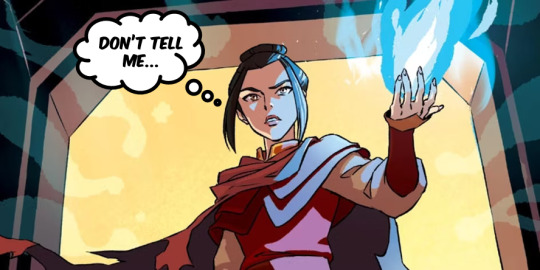
With Azula in the Spirit Temple nearing publication, here are my “Big Nos” for the story that, if any happen, will cause the book to be a failure for me:
1. The Kemurikage are not purged
2. Azula continues attacking the Fire Nation as a terroristic, stateless actor
3. The asylum is not criticized for its treatment of Azula and the Kemurikage girls
4. Azula does not criticize Zuko from a nationalist, old-regime perspective, instead just whines about him like a sore loser
5. Azula’s villainy is blamed on her personality, not the war
6. Tyzula is established without regard to Azula’s or Ty Lee’s established characters, and it becomes a distraction
Keep reading for details.
1. The Kemurikage are not purged
I don’t mean they need to be killed, or literally made to vanish, but the Kemurikage as a concept needs to end. The dressing up in costumes, throwing smoke bombs, and doing dastardly things not only needs to stop but it needs to be acknowledged as a mistake. Azula and the asylum girls can still be friends, maybe even remain a “group”, but the connection to Smoke & Shadow needs to be severed, which leads to the second no:
2. Azula continues attacking the Fire Nation as a terroristic, stateless actor
This has to stop and be acknowledged as a mistake. Full stop, it ends here. It should never have happened and Azula needs to feel bad for going down this path. Either Azula fights Zuko via a legitimate civil war, or Azula has to accept the country has moved on. She cannot act as a self-serving bandit harassing her country for mind-numbing reasons. The connection to Smoke and Shadow and all it was trying to do with this must be severed. Azula can rage about the events that caused her to go down this path, but she cannot continue down it, which leads to the third no:
3. The asylum is not criticized for its treatment of Azula and the Kemurikage girls
If the abuse at the asylum is whitewashed or ignored or even justified, that will be too much internal inconsistency for me to handle. The Search already tried to establish that the asylum experience was horrible for Azula and tried to break her. Azula can desire revenge, but not against her country and her people. She knows they don’t have that power. She has to hate the people chiefly responsible for putting her there, and letting her rot there, which leads to the fourth no:
4. Azula does not criticize Zuko from a nationalist, old-regime perspective, instead just whines about him like a sore loser
Princess Azula needs to show up. The one who is willing to use fire and lightning to kill people and conquer cities. She needs to hate Zuko on political grounds. She can acknowledge positive personality traits in Zuko that cause people to “like” him more than her, and she can complain about him as would an angry sister who has had her friends and family “stolen” by him, but she does not compromise her deeply held beliefs that the war, her father, and country were right and that Zuko and the Avatar were wrong, because she has not gone through that sort of journey yet, which leads to the fifth no:
5. Azula’s villainy is blamed on her personality, not the war
This better not happen. Azula having a personality that caused people to chafe around her is not villainy, it is a flaw. Azula was a villain because she furthered the Fire Nation’s war as one of her country’s leaders while being a model example of what her father and country expected from her, in other words, everything Zuko was incapable of being. The show even said this. Lording her “rightful” power over Mai and Ty Lee and having no respect for Zuko’s "weakness" is not villainy, it is, once more, a flaw.
If the narrative blames her interpersonal flaws for why Zuko turned against his country, why Mai and Ty Lee betrayed their crown princess, why she mentally broke and ended up in an asylum with Zuko replacing her as Fire Lord, and all the other events that have functionally destroyed her life as she knew it, then that leads to unfortunate implications. It means if only she had been nicer, Aang would have been defeated and the Fire Nation victorious and Zuko would be alongside her and their father helping dominate the Earth. It means if only she had been nicer, she would have been a more effective villain because she would have had allies to help her kill Zuko and Katara during Sozin's Comet. It means the war would have been fine as long as Azula was more like Iroh, smiling and drinking tea while razing villages and conquering cities instead of doing it with a smug smirk that makes grown men (and the viewer) feel small. And through all of it, Mai and Ty Lee would have been at her side, helping take over the world as loyal, loving friends, all because Azula was nicer.
Azula’s contribution to the Fire Nation's war and her belief in Sozin's legacy is why she had to fight the heroes, is why she lost to the heroes, but if it is blamed on her being an “abuser” rather than a military officer trying to take over the world, then this will be blatant character destruction that also diminishes the roll of Sozin and his war in corroding the spirit of the Fire Nation and its royal family, which leads to the sixth and final no:
6. Tyzula is established without regard to Azula’s or Ty Lee’s established characters, and it becomes a distraction
Azula could be a lesbian. She isn’t in the show. Azula and Ty Lee could fall in love, but the franchise decided to make Ty Lee hate Azula’s guts and Azula not have anything to say about it. In fact, Azula’s love life has nothing to do with the critical elements of her character that have caused her life to fall apart. Therefore, I can only conclude that Azula’s love life does not matter since the franchise doesn't think it matters. If this happens, it will be Korrasami pinkwashing to cover up franchise failures all over again. The internal inconsistency will be too much. Azula having a girl crush on “Beach” era Ty Lee is cute and makes sense, but Azula being a self-loathing, sexually frustrated, dark lesbian who is bitter she can’t have Ty Lee makes zero sense given all that has not happened to support either of them harboring such feelings for each other, and it will inevitably end up as the focus of Azula’s character development to the detriment of all else about her.
In conclusion, I don’t know what will make Azula in the Spirit Temple a good story, but I know what will make it a disappointing one. Faith Erin-Hicks was handed a massive task. I hope she was successful.
226 notes
·
View notes
Text
Excellent Fan-Artist - Adajel
Adajel is an outstanding graphic artist who does a lot of ATLA.
Their work is, in my view, the most vibrant and impactful since the show. Recently, they did a striking portrait of Azula inspired by my fanfic. I’ve posted it below. Please visit Adajel’s blog to see more of their great work.
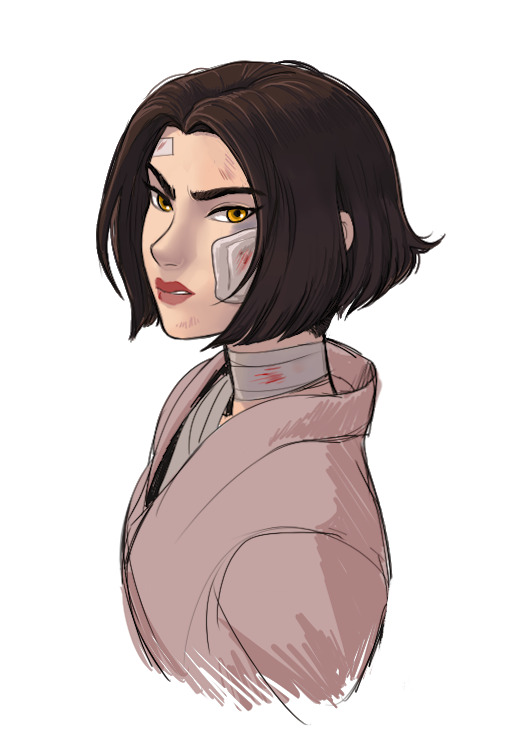
Source: @adajel
187 notes
·
View notes
Text
Favorite Avatar Face of All Time
I think this is my favorite non-meme Avatar face of all time. It’s a perfect example of how animation can exaggerate facial expressions for dramatic effect while still keeping the character ‘human’. This is what I mean by ‘non-meme’. It’s subtle but effective.
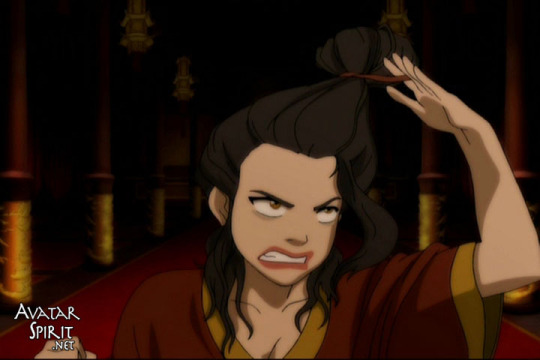
You can see it in the over-sized eyes and the squiggly lips. Especially in the squiggly lips. People’s lips don’t look like that! Yet they look right in that image. This is the concept of “Stretch and Squash”.

In Stretch and Squash, the area of the face/object stays the same while the shape changes. This helps keep animation outside the “uncanny valley”.
Avatar had so many great faces. The best part of Azula in the Finale was the variety of exaggerated facial expressions that were so, so well done, especially from a character who had never shown that emotional range. The animators really stepped up their game for the Finale and it shows in how they animated Azula.
166 notes
·
View notes
Text
Avatar Comics Good Reads Ratings - Troubling Trends
Good Reads is a website where members can rate and review books such as Harry Potter, The Hunger Games and even the Avatar comics by Dark Horse. Good Reads says they have about 90 million registered members.
I was curious about what the results would show for the Avatar comics by Dark Horse, so I took the quantity of ratings for each installment and converted them into graphs. The quantity of ratings denotes how popular a work is on Good Reads, not necessarily its quality.
For example, Harry Potter #1 has over 6.5 million Ratings whereas The Martian ‘only’ has 750,000. That doesn’t tell you how ‘good’ either book is, just that one is more ‘popular’ than the other. Both are very different stories.
Here are the Good Reads ratings for all the Dark Horse Avatar comics (excluding Imbalance):
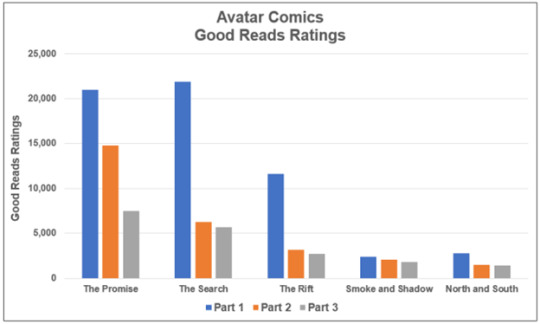
Assuming this data represents the fandom’s popular reception to these works (i.e. how many liked them enough to spend money), here are some interesting takeaways:
Most follow-on works don’t do as well as the first installment but The Search had more ratings for its Part 1 than The Promise’s Part 1. However, The Search also saw a much, much steeper drop in ratings than The Promise. The Promise actually held its readers pretty well until Part 3.
Half as many fans returned for The Rift than The Search but The Rift also saw a precipitous collapse in readers similar to The Search. The Rift maintaining half of The Promise’s initial readers is actually over-performing, as you will see.
Usually, you expect a ‘sequel’ to receive 2/5th as many readers as the first installment’s peak. This can be illustrated by taking Harry Potters and The Hunger Games’ Goods Reads ratings and comparing their first installment numbers to the follow-on works.

You can see how, for even cultural phenomena, the sequels never do as well as the first. This isn’t always the case but it’s a near universal trend.
Another trend is also visible: a popular work holding its readers after the first installment.
This is illustrated by a similar bar graph for Brandon Sanderson’s Mistborn series. It held its readers well over its run until eventually running out of steam like all series do. I’m using Mistborn as an example because it doesn’t have the ‘cultural baggage’ of Harry Potter and The Hunger Games that could potentially throw things off for those titans of contemporary literature.
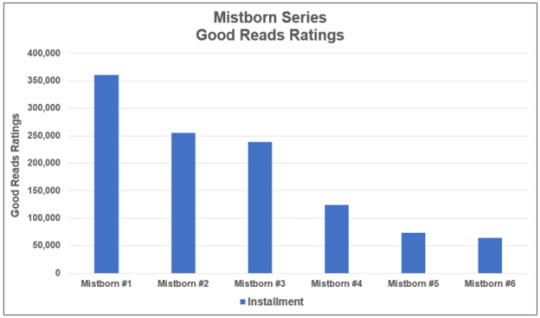
You can see Mistborn held fans very well after the first installment, much better than even Harry Potter and The Hunger Games, with the 2nd and 3rd installments maintaining their popularity almost exactly. It wasn’t until Mistborn #4 that there was another drop, but even then the readers who remained mostly stayed for #5 and #6.
What do the The Hunger Games, Harry Potter and Mistborn have in common? They held their readers.
This can be further illustrated if you graph the Good Reads ratings as percentages relative to the first installments. In other words, if the first installment’s peak represents 100% of the popularity, then the next installment is 75% and the next is 50% and so on.

You can see the 2/5th drop I mentioned earlier. While Harry Potter and The Hunger Games saw big drops compared to their first installments, Mistborn didn’t reach the 2/5th drop until Book #4 and only saw a steady decline over the lifetime of the series. However, both The Hunger Games and Harry Potter maintained their followings more consistently after the first book’s drop while Mistborn held its Book #1 readers much better overall.
Converting these bar graphs to lines, you get the following ‘slopes’:

As you can see, rapid drops for The Hunger Games and Harry Potter followed by steady-state readership, while a steady decline for Mistborn with periods of steady-state readership for Books #2 and #3, and Books #5 and #6.
So what does this say about the Avatar comics? Taking the total ratings for each Avatar installment, averaging them, and adding them to the above graph, you see that the Avatar comics never held its readers until the very end, but by that point, the total readership was a mere fraction of the The Promise/Search high.
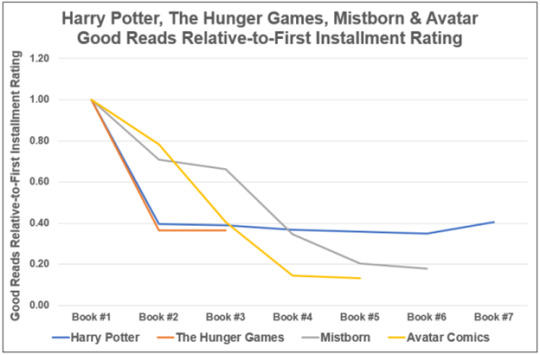
This graph is actually misleading for the Avatar comics.
Since each installment was broken up into three separate volumes, and published at different times, readers were able to ‘opt out’ of an installment if they wanted. This means turning each installment into an ‘average’ artificially props-up them up since the first parts of The Search and The Rift over-preformed compared to their second and third parts.
It’s really the first bar graph at the beginning of this article that tells the story.
I’ve added the 2/5th line to the first graph as shown below:

From this graph, with the 2/5th line added, you can see the vast under-performance of the second and third volumes of the The Search onward.
Why did this happen?
Why did the Avatar comics, when Avatar had a massive built-in fan base, never hold its readers until the end? Why did it only get in the range of 22,000 ratings for a peak when Mistborn #1 has over 360,000? Remember that the Avatar finale received over a 5.5 million viewers. Mistborn doesn’t even have a television show!
Here’s why I think this happened:
First, Avatar is supposed to be animated and epic. When fans learned that the Gaang+Zuko & Azula were continuing in mere ‘graphic novels’, especially ones that looked ‘kiddie’ in nature, they probably thought, “Really? That’s lame!” and were disappointed. No matter how well-written or mature these graphic novels were, they’d never have the same exposure as the animated spectacle; 73 pages per book for an 8-11 year old audience is simply not enough.
Secondly, the premises of both The Promise and The Search appealed to the general fan base. That’s why the ratings for both Parts 1’s are basically the same. The premise of The Promise is that it is the next story of Team Avatar. Of course that’s going to draw fans!
The premise of The Search, on the other hand, gets into the loose-threads of the franchise, namely the Zuko-Azula-Ursa family drama triangle. Both of these premises are rather distinct from one another and, technically, could have been completely separate story lines (the Gaang gets a dedicated plot line, the Fire Nation royal family gets another). This is why both had near the same amount of readers for both Part 1′s: they were addressing topics the general fan base already wanted.
However, once readers ‘got inside’ these books, in particular The Search and The Rift, they opted out and became apathetic. This apathy is why Smoke and Shadow and North and South tanked... Hard.
Even though Smoke and Shadow was supposed to continue the Fire Nation royal family triangle, Smoke and Shadow’s Part 1 rating is only 11% of The Search’s Part 1.
Yikes!
Even Mistborn #6′s ratings was 20% that of Mistborn #1, and Azula and Ursa’s relationship hadn’t even been resolved!
The specific reasons for why the comics hemorrhaged readers is anybody’s mystery. Certainly plenty has been written about it. Much can be said about the poor writing, half-baked plots, bad characterization, childish tone, etc.
What I hope these graphs give you is an idea of the ‘numbers’ behind fiction, and in particular, Avatar’s current Post-Finale comics. We don’t know what the true purpose of the comics was (Make money? Keep the fandom alive? Keep the copyright relevant? Drive away its teenage/young adult fan base?), but it’s clear they didn’t appeal to Avatar’s fan base as they should have.
Whether you like the comics or hate them, one thing is clear: they should have been a lot better.
As an aside, take a look at Gene Yang’s American Born Chinese Good Reads ratings compared to the performance of the Avatar comics. American Born Chinese is what allowed Gene Yang to be taken seriously for the Avatar comics. Also keep in mind that Avatar had a built-in fan base.

And if you compare American Born Chinese’s Google Trends results to Avatar: The Last Airbender’s, you get the following graph:
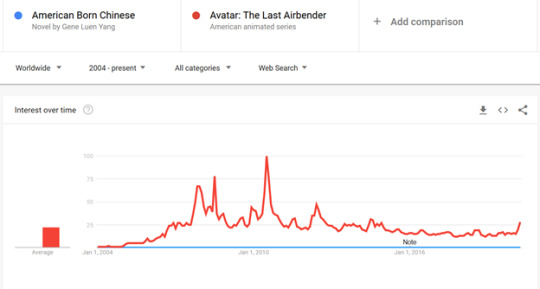
In the words of Charlie Brown: good grief.
56 notes
·
View notes
Text
Hicks and Yang on Azula Fans
Cult.
Upset.
Scary.
Aggressive.
During the 2019 San Diego Comic Con, an Avatar Q&A was held including Michael Dante DiMartino, Gene Yang and Faith Erin Hicks.
One fan asked about the franchise’s plans for Azula. Here is a summarized transcript of the exchange, with my own commentary:
Fan: “Hi, so the comics have shed light on characters who have a lot more of their story to be told after the Finale. I has wondering if you might be able to, if you have any plans for, expanding on a character you’d mentioned before: Azula.”
I can hear the trepidation in this fan’s voice; they can’t just come right out and say it. I know the feeling: should I feel interested in Azula? Will others understand why? Will they accuse me of minimizing her evil and villainy? Am I minimizing her awfulness in the show? Am I even right to want more Azula?
Yang’s answer:
Yang: “I have to say, in my experience with Azula Fans, it has been almost like a cult [crowd erupts in laughter]. Not saying you are!”
Well, actually, Yang, you kind of are.
And you didn’t answer the question.
You know what’s also a cult following? The Princess Bride movie. But was Yang referring to that kind of cult? No, because nobody would think twice about insulting Princess Bride fans by referring to that movie as having a “cult-like” following.
No, Yang was referring to that kind of cult, the one where if you accuse someone of being a member, you are insulting their intelligence and accusing them of borderline nefarious obsession. Yang was referring to the spooky, deranged kind that believes aliens seeded the Earth with Human life and built the pyramids. Only in the case of Azula fans, the original show seeded Azula with humanity and left the door open for a deep, compelling change-and-growth story in the Post-Finale setting.
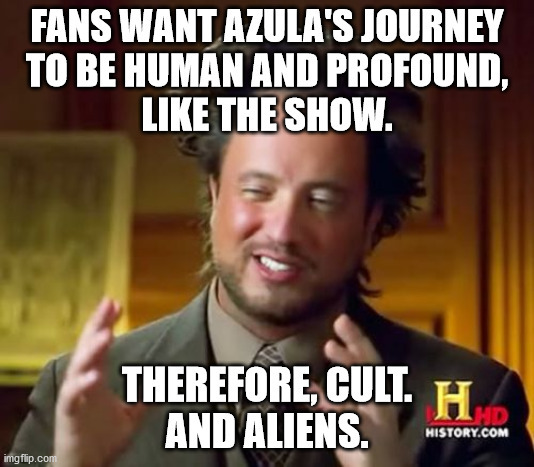
Hicks’s answer:
Hicks: “I have to say, for the most part, Avatar fans have been just absolutely lovely to me, but I got this scary e-mail from someone who was an Azula fan and was very upset and aggressively demanding that I write her a certain way. I actually had to shut down my e-mail because it unnerved me so much. And it was a little weird because Azula is one of my favorite characters as well, but it made be scared off, perhaps, from writing her in the future.”
God dammit. Hyper-sensitive and impassioned fans are everywhere. This most certainly occurred. Even Bryke have spoken about getting hate mail from jilted fans. At any rate, to anyone reading this, don’t do this. Clearly Hicks doesn’t have the intestinal fortitude to put up with it, neither will it change hers or anyone else’s minds.
Azula’s place in the franchise isn’t where it is because fans haven’t been loud enough; she’s a secondary character and a villain. If they were ever going to expand her non-villain role in the franchise it would have happened a long time ago. As the articles “She’s Completely Crazy!” and Mirror & Misdirection explain, the piss poor handling of her character comes from a much deeper, unchangeable source in the Creators’ minds.
But the first thing that jumps to Hicks’ mind is one instance of hate mail? Telling this fan she is grouped in with someone who is scary, upset and aggressive? And that is enough to scare her off?? Holy shit. Hooooly shit. She better not be tasked with salvaging, or even writing, anything regarding Azula. Someone tasked with writing Azula, I mean really writing Azula, especially after the mess of Smoke & Shadow, needs far more guts than this. She is far too spooked by fans, and the current canon and lack-of-vision of Bryke is only going to infuriate more.
Hicks’s answer continued:
Hicks: “So please be kind to creators. We’re working very hard on licensed properties. I know none of you guys [the crowd] would do this [send hate mail; crowd erupts in laughter]. Um, I love Azula. I think she’s great. I would like to write her. I would like to write more stories. Gene actually left her place in the world very open-ended. I actually loved the way Gene wrote her. I liked Smoke and Shadow a lot. I think that story and where Azula’s journey went was really fascinating to me. So yeah, I would like to write Azula stories. As of right now, I’m writing new Avatar stories, not necessarily about Azula, but maybe someday in the future. Azula fans, please be nice to me. I’m trying my best.”
First of all, nobody cares about Smoke and Shadow. Yes, nobody. Its popularity on Goodreads nose-dived compared to The Promise and The Search. There are parts of it that are okay and likable, but not the work itself. I will give Hicks the benefit of the doubt that she is just going, “Yes, my Emperor! Your clothes are beautiful!” to her naked overlords. Smoke and Shadow was a mess for more than just Azula and an utter train-wreck for Azula. Don’t read much into that comment by her.
She is scared off from writing Azula, but still wants to writer her. Wants to. Whether we get more Azula shouldn’t come from her wanting to, she should have to if that is the plan for the franchise. More evidence that the franchise has no overarching plan for telling compelling stories about these characters. It doesn’t matter if fans know that Azula is destined to become Zuko’s closest advisor. It doesn’t matter if fans know Zuko and Azula reconcile, as implied by generous interpretations of Smoke and Shadow.
Well, duh!!
Of course that’s going to happen. It’s the only logical outcome that is consistent with the themes of the show. Fans don’t want to be told what happens; they already know what has to happen. What fans want is to see HOW it happens. They want to see the journey, and right now the journey is crap, and the franchise doesn’t even appear to know what they even want the destination to be.
This Post-Finale setting, while containing some nuggets of gold when taken out of context, are an unplanned, butchered mess that does far more telling than showing, and the telling it does is half-baked and confusing.
“Licensed properties” is an important key word, however. It reveals the reality that Faith Erin Hicks has guard rails put on her, whereas for us fans, our imaginations are the limit and is not constrained by canon, deadlines or the commercial realities of Avatar.
“Licensed properties” also implies the Creators. While we can think of all the great ways a novelist or a competent manga author could create a sweeping epic about both Azula, the Fire Nation and her ultimate place in the Avatar world, the commercial realities of Avatar might just not allow it: Zuko and Aang are the faces of the franchise, followed by Katara. Everyone else are just secondary characters. As a result, Azula becomes a razor thin eggshell painted to look like a person but is not actually a person because the Creators have neither the time nor inclination to turn her into one.
And lastly, “I’m trying my best” is not a very assuring statement. Once again, more evidence that there is no plan or even “faith” in what they are doing. If these authors have to “try” then they don’t know either their market or their product. They’re hoping fans will like what they come up with versus buckling down and actually figuring out how to tell Avatar stories worthy of Avatar’s reputation.
So remember Azula Fans, or Avatar Fans, if Azula Fans are even counted as Avatar fans, your desire to see a competent, well-written, compelling and emotionally-gripping Azula story makes you part of a:
Upset,
Scary,
Aggressive,
CULT.
Well, they certainly got the first one right.
P.S. Don’t harass Faith Erin Hicks. The situation with the comics and Azula are way above her pay grade. At best, we can learn why.
231 notes
·
View notes
Text
"She’s Completely Crazy!”- What Bryke Think of Azula
Avatar: The Last Airbender ended 12 years ago but the franchise has lived on; the original cast and setting continued both in graphic novels and in Korra, and now with a live action adaptation on the horizon, it is clear that the franchise is not dead. That being said, ask yourself this: in the 12 years since the Finale aired, does Azula’s character in the context of the themes and lessons of the Avatar world make sense to you?
Has the franchise provided a clear explanation for what Azula wants, why she wants it and why she can’t have it? In other words, her Goals, Motivations and Conflicts?
Has the franchise explained why Azula uses “fear to control people” and why her role as a feudal military leader-in-training is supposedly not the answer?
Has the franchise explained why the Mirror Scene occurred and what the nature of Azula and Ursa’s relationship actually is?
Has the franchise explained the significance of Azula being afraid of her father and fearing being treated like Zuko? How could Little Miss Perfect be afraid of anything???
Has the franchise explained why Azula wants to be “the greatest leader in Fire Nation history” as stated during the Finale?
Has the franchise explained how the “Princess” aspect of Princess Azula affects who she is and what she wants?
And, has the franchise taken Azula’s humanity as revealed in the Finale and developed it to the point where she has joined the pantheon of beloved, complex Avatar characters? Or, has she remained a controversial enigma with no clear place in the Avatar world?
If you haven’t read Mirror & Misdirection - The Distortions of the Mirror Scene, I encourage you to do so; it is lengthy but provides useful insights into these questions. At the same time, I also encourage you to read The East Asian Origins of the Fire Nation and Its Villains. It provides a detailed theory on the Fire Nation’s history, politics and the origins of the Imperial Government and how they might influence a villain like Azula. Otherwise, happily continue.
If anyone could shed light on these questions it would be the Creators Mike and Bryan. Right? They’re the Creators. They should know everything about the show they both created and led the development of.
The following quotes are transcribed summaries of audio commentaries from The Crossroads of Destiny, The Beach, The Phoenix King, Into the Inferno and Avatar Aang as they pertain to Azula.
Note that these comments are from the Creators, not fans; they are supposed to come from a place of understanding and nuance. Pay close attention to what is both said and not said, and ask yourself this:
Do these comments really sound like they’re from writers who understood their character on a deep level?
The Crossroads of Destiny
Scene: Azula Beating Long Feng
Bryan: “Yeah, unfortunately in real history, there are people like Azula, who are just so charismatic, but sort of soulless that they’re… You know, but they’re able to climb to positions of influence. Same with, uh, people like Long Feng, unfortunately throughout history. People who are willing to sell out their own--own countrymen, just for their own, uh, security, you know, their own job security.”
So Azula is one of those people who are “soulless” and “unfortunately” exist? She is “selling out” her country by doing both what her country wants and what its supreme ruler has ordered? This makes her “soulless” because...?
The Beach
Scene: Ty Lee Getting Fanned
Bryan: We always see Azula as evil but pretty much perfect. You never see any weaknesses. Her crazy, over the top manipulative personality doesn’t really work in social situations… This was all delightful [spoken with emphasis] to see.”
Scene: Azula Apologizing to Ty Lee
*no comments made, just talking about music and dancing*
Scene: Azula Finding Zuko
*no comments made, just talking about “emotional teenage beach stuff”*
Scene: Campfire
Bryan: “She seems so cold even when she’s expressing herself [spoken with sarcastic flair]. Azula is just so comfortable in her skin.”
Comfortable in her own skin... Except when boys are rejecting her, she’s insulted Ty Lee and she reminisces about her mom? What about her apologizing to Ty Lee? What about when she called her family’s old beach house “depressing”? This makes her “soulless” because...?
The Phoenix King
Scene: Phoenix King Coronation
Mike: “This is the first beat of the Finale where we start to see Azula crack a little bit. We’ve hinted at it in 3.15 and 3.16.”
Bryan: “... Azula’s whole framework of fear, domination and manipulation over the people in her life just started to crack and we realize that right under the surface of Azula is a pretty scary mess [laughter]. You know she’s very good at controlling people and being charming or being good in social situations [corrects himself], other than hitting on guys as we’ve seen. Anyways, other than that, she’s completely crazy!”
Azula’s personality does not work in social situations yet she is good in social situations...? Azula can create blue flames and lightning but right under the surface is a “pretty scary mess”...? Azula reveals she is afraid of being treated “like Zuko” but she’s “completely crazy” for it...? She is afraid of her father, Ozai, the big bad, the one who harmed Zuko, and she is completely crazy...?
Into the Inferno
Scene: Cherry Pit
*no comments made: silence through the whole scene*
Scene: Banishing the Dai Lee
*no comments made*
Scene: Lo and Li (”I Will Be the Greatest Leader in Fire Nation History”)
*no comments made*
Scene: Mirror Scene
Bryan: “This is probably one of our favorite scenes in the whole series.”
Mike: “Yeah [excitedly]!”
Bryan: “We carefully plotted Azula’s unraveling since the end of 3.15 and this was meant to be when you really knew that she had cracked.”
Mike: “Yeah, we wanted, like, visual representations of her craziness [proceeds to talk about visual descriptions].”
Bryan: “I also like the ambiguity of this scene: is it really her mother? Is it a ghost? Is it something in her head?
Mike: “Yeah, cause you want going into that final showdown with Zuko, you want that feeling of, like, not only is she super powerful on this day but she’s totally out of her mind [chuckle] and a total loose cannon.”
Bryan: “Yeah, so how can Azula be more dangerous and even crazier [chuckle]?”
“Carefully plotted” but no comments on the role of her father and wanting to be the greatest leader in Fire Nation history...? No comments on the three other scenes showing her downfall...? “Carefully plotted” but Azula’s downfall arrives in the span of two episodes...?
Avatar Aang
Scene: Azula’s Breakdown
Bryan: “We didn’t want a story where everything is better and they killed all the bad guys; you know what, things are complicated and not so happy. Even though Zuko had to fight his sister, he’s not happy about it; he didn’t want to kill her. You kind of feel a bit bad about Azula. It’s not the triumphant hero victory; it’s more realistic and also what that would be like.
*proceeds to discuss Zutarians before Azula’s breakdown is finished*
“Things are complicated” but Azula is “completely crazy”? You’re supposed to feel “a bit bad” for Azula but she’s a soulless, scary mess that “unfortunately” exists? Azula’s breakdown isn’t even over and you’re ragging on Zutarians while this supposed emotionally heavy scene is still going? What...?

Do these sound like the comments of writers who were trying to create a fictional person, and sell you on that fictional person’s Goals, Motivations and Conflicts?
No.
These sound like comments made by purely aesthetic-driven artists who were trying to create a painted, hollow egg; empty on the inside but pretty on the outside; a brittle-yet-colorful shell of a person that “cracks” under the slightest of pressures because there is nothing inside, just a soulless, crazy, scary mess. In other words, nothing like an actual person.
Do these sound like the comments of Creators who took pride in showing the reasons for the mental collapse of such a strong character and wanted the Fandom to understand what drove this character and why they were so driven?
No.
These are the comments of movie directors who wanted a certain “image” on the screen, a “sound” to make the viewer feel but not think. To these movie directors, Azula’s mental collapse was a joke; it was a titillating opportunity to take the always-in-control, “perfect” Azula and throw her under the bus of adversity so we can laugh at the sullied, pummeled mess that comes out the other end; it’s fun and awesome; an experience; a joke.
Azula once made a joke to Aang. He didn’t laugh.
Bryke once made a joke about Azula. We didn’t laugh.
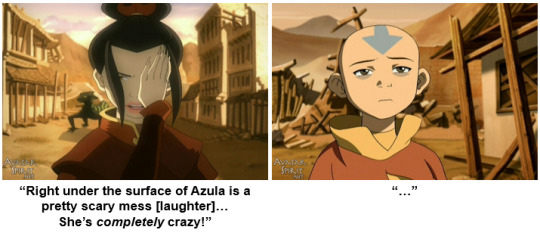
Do these sound like the comments of writers who were trying to apply the themes and lessons of the show to one of its teenage/child characters? Do these sound like the comments of adults who had an ounce of compassion for sending a teenage character down an emotional breakdown that ends with them crying, hyper-ventilating and writhing in chains underneath a blood-red sky... And presumably in prison for the foreseeable future?
No.
In fact, these comments sound familiar. Think of how many times Bryke used the word “crazy” to describe a character as complex as Azula. Where have we heard this before...?

These are not the comments of all-knowing Creators who used Azula’s downfall to tell a story worthy of Avatar’s reputation.
These are not the comments of writers who looked for a way to tie Azula into the greater themes and lessons of the Avatar world.
These are the comments of 8 year old boys doing it for the “lulz” because it looked and sounded cool.
You might be thinking: what about the interview from the Sozin’s Comet novelization? The one where they talk about “corroded spirits” and “jealousies”? That everyone in the Avatar world has a “softer side”? That not feeling loved by her mother “drives her crazy, literally”? That all these things made her “become that way”?
Have that interview in mind? Good. Now ask yourself this: does that interview answer any of the questions from the beginning of this article? Does that interview even sound like they “carefully planned” both Azula’s character and her downfall?
No. In fact, it sounds forced.
Additionally, here is an interview from Gene Yang discussing Azula for The Search comics, which Bryke were deeply involved with. What does this interview sound more like: the Sozin’s Comet interview, or the numerous audio commentaries where Bryke are laughing and enjoying themselves?
Gene Yang: “She’s totally in control for most of the animated series, and then at the very end, she cracks. She goes insane. We wanted to keep both her controlling side and her crazy side in the comics, so we gave her something of a split personality.”
Insane. She cracks. Her crazy side. Split personality.
There isn’t anything about her relationship with her father, her country or herself. There isn’t anything about her Goals, Motivations and Conflicts. In other words, there isn’t anything about her being a person.
To the Creators of Avatar, a show that spent ample time teaching us not to succumb to hate and dehumanization, Azula isn’t human. She’s not driven by anything that can be understood or explored, empathized with or that is even relevant to the greater themes and lessons of Avatar. She is simply a soulless, crazy, scary mess that can be laughed at. Think about this: Azula is a character in Avatar.
In Avatar!
Azula is a character in Avatar and the Creators don’t consider her human.
So if you thought Bryke viewed all of Avatar’s characters as being complex, layered and worthy of being understood, you were wrong; they never did.
And if you believe Bryke currently has, or ever will have, the intention of turning Azula into the complex, layered and compelling person that the Finale showed us exists, I have three words for you:
Where’s. The. Evidence?
Azula is a character in Avatar: The Last Airbender and she can be summarized by three short lines by its Creators:
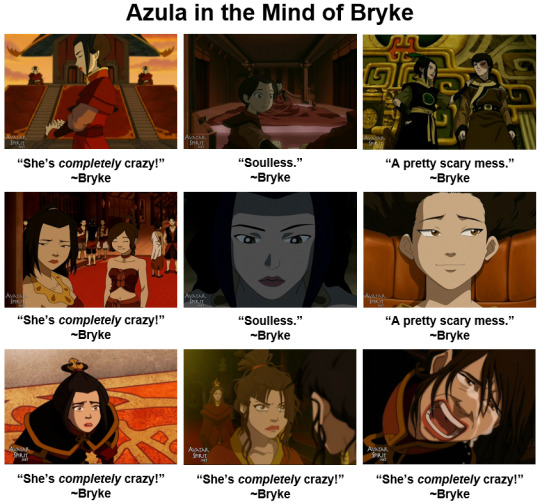
So what do Bryke think of Azula? What is the deepest understanding that the Creators of Avatar have for one of their most complicated characters?
She’s completely crazy!
And they say it with a chuckle.
What was that about them wanting things to be complicated?
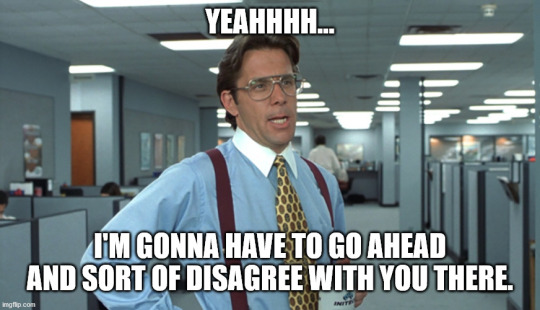
500 notes
·
View notes
Text
The Unfinished 2nd Half of Zuko’s Journey
Zuko’s journey consists of two parts. The first part we saw in the show; it was Zuko receiving his Uncle’s forgiveness and becoming Fire Lord. The second part we did not see; it is his struggle to restore the honor of the Fire Nation.
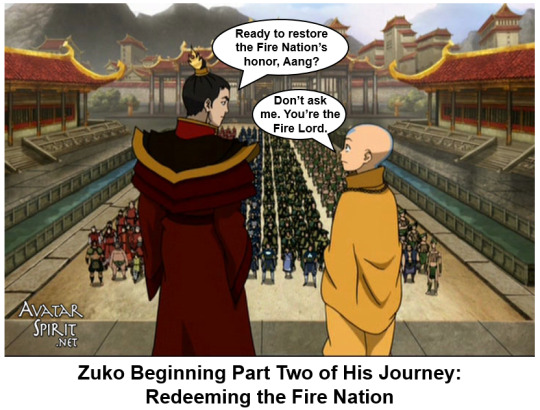
The True Ending of Avatar
The ending for Avatar was not Aang and Katara kissing in Ba Sing Se in front of a beautiful sunset followed by the word “The End”.
No, the true ending of Avatar was Zuko’s coronation. That was the moment when you knew the Gaang had accomplished their goals, that their journey was complete and that the Avatar world had changed for good; the Fire Nation’s war was over and Zuko was the Fire Lord who was going to restore the honor of the Fire Nation...
... Going to. He had not done it yet by the show’s end.
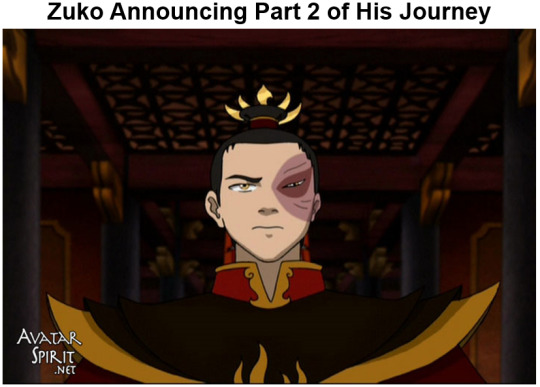
Zuko: “I promised my Uncle that I would restore the honor of the Fire Nation, and I will.”
“And I will”... Will. It was a new goal that hadn’t been achieved and you can bet your butt it wasn’t over three months later. Now read the next lines:
Zuko: “The road ahead of us is challenging. A hundred years of fighting has left the world scarred and divided. But with the Avatar's help, we can get it back on the right path, and begin a new era of love and peace.”
The road ahead is “challenging”. “Get it back” on the right path. “Begin” a new era of love and peace.
Restore the honor of the Fire Nation... A Goal.
Begin a new era of love and peace... A Motivation.
The road ahead is challenging... A Conflict.
These are the beginnings of an entirely new story for the franchise; a logical continuation of the original cast that does not erase the significance of what came before. It is the continuation of Zuko’s stated Goals and Motivations at the end of the show where he must change and grow in order to become the Fire Lord that redeems the Fire Nation.
It is the beginning of the second half of Zuko’s journey.
Where Aang’s Journey Ends, Zuko’s Endures
Aang’s journey in the show consists of a single, clear goal with a definite endgame: master all four elements and defeat the Fire Lord. Once Aang masters all four elements, he is ready to face the Fire Lord. Once he defeats the Fire Lord, his journey is over. How he masters all four elements and defeats the Fire Lord, along with the people he meets along the way, is what makes the story deep and compelling. This is where Zuko comes in.
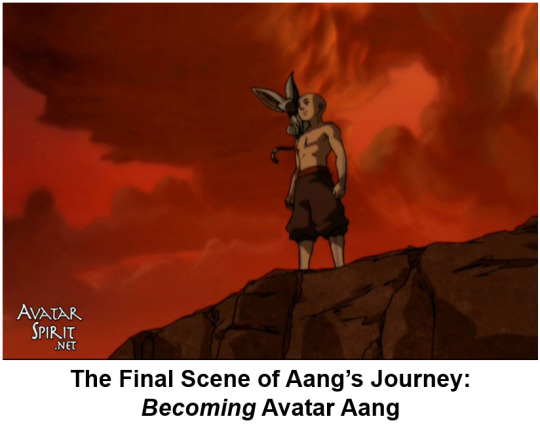
The purpose of Zuko’s journey wasn’t clear for over half of the show. Until Iroh spelled it out for him in Avatar and the Fire Lord, it appeared he was a morally ambiguous wild card who could end up on either side. Why Zuko’s inner turmoil was so important to Aang’s journey was not clear.
Indeed, we did not know the full importance of Zuko’s journey until he stood up to his father in Day of Black Sun. That’s when learned why Zuko was important: he was the crown prince abandoning the evil ways of his country to help the Avatar save the world.
So you’d think that when Zuko helped Aang master firebending, defeated his sister in the Agni Kai and was crowned Fire Lord that his journey was over, right? That being crowned Fire Lord was Zuko’s reward for being a sensitive, gentle soul unlike the ruthless, warmongering norm in his family?
That he’d spend the rest of his days slowly coping with his trauma while enjoying endless, relaxing days of romantic bliss with Mai? That he wouldn’t face internal opposition from the diehards and stalwarts of the old regime? That from the start of his reign he would be leading a Fire Nation that was fully accepting of him and everything he stood for… Right?
Wrong.
The Tragedy of the Fire Nation
In addition to the central conflict of ending the Hundred Year War and Aang’s need to defeat the Fire Lord, there were numerous subtle threads running through the show that gave Avatar its heart and soul: the tragic, lasting effects of war on a people and their culture, the effects of foisting too much responsibility on children, the importance of friendship and having people to lean on, among many others. One of these threads concerned the topic of how decent, normal people can turn bad.
In Season 1, it is revealed that Avatar Roku—a firebender—was a respectable, honorable Avatar despite being a member of the Fire Nation.
In the same season, a Fire Sage helps Aang in his effort to connect with Roku despite being loyal to the Fire Nation and Fire Lord and Avatar.
Aang: “If this is the Avatar's temple, why did the Sages attack me?” Shyu: “Things have changed. In the past, the Sages were loyal only to the Avatar. When Roku died, the Sages eagerly awaited for the next Avatar to return. But he never came.”
In The Blue Spirit, Aang laments to Zuko how one of his best friends was Fire Nation and says to his enemy, “Do you think we could have been friends, too?”

A Fire Nation admiral and firebending master—Jeong Jeong—deserts out of disillusionment with the war.
And Iroh fights Zhao to stop him from destroying the Moon Spirit, to which Zhao does agree, for a moment, until his temper gets the better of him, showing that concern for harmony and balance isn’t a lost concept in the Fire Nation; it’s just buried deep.
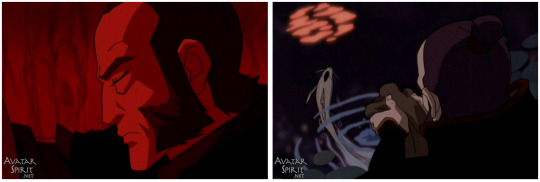
In Season 2, Aang rescues the child of Omashu’s occupying governor, ignoring the practical advantages of keeping it as a hostage, and we are explicitly shown how happy this makes the invaders.
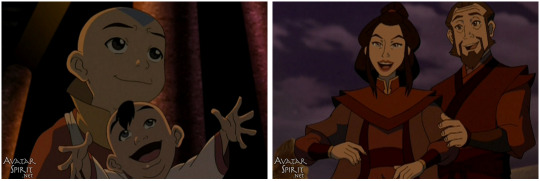
In Zuko Alone, Zuko becomes a truly sympathetic character. We are shown how he has always struggled to live up to the expectations of his warmongering family, and leading up to Season 2’s finale, Zuko and Irohs’ disillusionment with their country reaches new heights, showing that the militaristic expectations of the Fire Nation isn’t even embraced by all members of its ruling family.
In Season 3, the Gaang lives in the Fire Nation. We see Fire Nation people, their kids, their towns, their daily lives. Aang is actually excited to be in the Fire Nation because it reminds him how much fun it was before the war.

In Avatar and the Fire Lord, Roku is shown to have been the best friend of the Fire Lord that started the war, but Sozin’s desire and willpower to achieve his goals corrupted him, and in that same episode, Aang comments that friendships can transcend lifetimes, suggesting that the Avatar and the Fire Lord can be friends again. Ultimately, this is proven true when Zuko joins the Gaang, helps them stop the war and becomes friends with Aang.

Toph: “It's like these people are born bad.” Aang: “No, that's wrong. I don't think that was the point of what Roku showed me at all. Roku was just as much Fire Nation as Sozin was, right? If anything, their story proves anyone's capable of great good and great evil. Everyone, even the Fire Lord and the Fire Nation have to be treated like they're worth giving a chance. And I also think it was about friendships.”
Everyone, even the Fire Lord and Fire Nation, have to be treated like they’re worth giving a chance. Even if they don’t ask for it.
But most importantly, at the start of every episode, Katara says the Four Nations used to live together in harmony.
What the show was saying in so many small ways was that the Fire Nation’s war and what its leaders had become were neither normal for the Avatar world nor for the Fire Nation itself. Not even Chin the Conqueror’s conquests of the Earth Kingdom holds a candle to the Fire Nation’s multiple layers of evil, self-interest and disregard for world balance. It was a world first, even for the Fire Nation.
While the existence of the all-powerful Avatar, in theory, helps keep the peace between the four nations, the Fire Nation did not used to be hostile to the other nations. Sozin changed the old Fire Nation, the one that was peaceful and enlightened, that achieved an unprecedented era of prosperity, that convinced Sozin that the Fire Nation was first among equals. The fun, friendly Fire Nation that Aang remembered was lost and it stayed lost for a hundred years…
… And the solution wasn’t to destroy the Fire Nation.
The True Purpose of Zuko’s Journey
Until the series finale, Zuko’s journey appeared to be about him achieving moral redemption for his time spent as a halfhearted, incompetent, semi-accomplice in his nation’s evils. But Zuko did not turn against his father and help the Avatar in order to redeem himself of his sins. No, he turned against his country because he was alienated from it, couldn’t meet its expectations and became disillusioned with its goals. In other words, because it was what Uncle Iroh had taught him.
Zuko’s heart told him that betraying Iroh in Ba Sing Se was wrong and that he needed to right that wrong. To Zuko, doing the right thing meant following Uncle Iroh’s guidance and accepting him as his true father, and to do that required switching sides. Zuko’s redemption was not achieved when he stood up to his father. It was not achieved when he stood victorious over Azula. It wasn’t even achieved when he became Fire Lord at the end of the show. Zuko’s redemption was when Iroh hugged and forgave him. That was the moment of catharsis for Zuko. That was his “redemptive” moment.
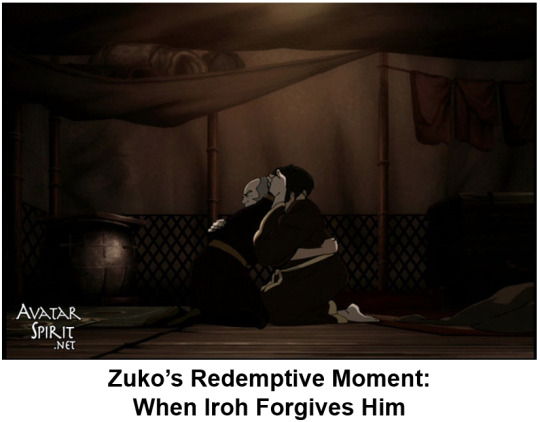
Zuko wasn’t redeemed when he showed people he was “good” or “righteous” or “honorable”. Zuko was redeemed when he felt accepted as a son... By his uncle.
Unfortunately, Zuko’s troubles were deeper than his banishment and Agni Kai with his father. In short, he simply didn’t belong in the Fire Nation he was born into.
Zuko was a normal boy born into an abnormal situation that he didn’t have the personality for. He didn’t have the ruthlessness, intelligence, competence, precociousness and raw talent for militarism and totalitarian rule that his sister had, so he failed to live up to his father’s self-serving, power hungry expectations which, in turn, represented the peak of malice, moral corruption and ruling-through-fear that the war had instilled in the country’s leadership.
In fact, Zuko also didn’t live up to the expectations of his country, as revealed by his monologue in Siege of the North Part 2.

Zuko: “She's a firebending prodigy – and everyone adores her.”
Hmm. I wonder who “everybody” is...?
If you think the Fire Nation’s militarism is simply the result of genetic predispositions, I encourage you to read The East Asian Origins of the Fire Nation and Its Villains. It helps shed light on the potential reasons why a “soft” boy like Zuko might struggle in a militaristic culture such as the Fire Nation’s.
So when Zuko finally realized the righteous path and followed it, his story was over, right? He stood up to his father and Iroh forgave him. He showed us that he had a pure heart and was a good person and good, moral people are supposed to be rewarded for their innate qualities, right? What only mattered to Zuko’s journey was that he help the Avatar, vanquish his sister and end the war by royal decree so that a new era of love and peace could begin… Right?
Wrong again. Iroh even says so when he tells Zuko that his journey is not over when they are together in the White Lotus camp in The Phoenix King:
Iroh: “… Someone new must take the throne. An idealist with a pure heart and unquestionable honor. It has to be you, Prince Zuko… And only you can restore the honor of the Fire Nation.”
Until that moment, Zuko had no visions of himself as the ruler of his country, never mind changing anything about it.
Let me repeat that.
Until THAT MOMENT Zuko had no visions of himself as the ruler of his country.
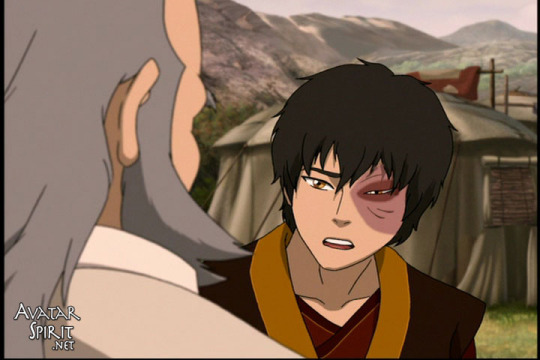
Zuko: “And then... then would you come and take your rightful place on the throne?... I'll try, Uncle.”
Very reassuring words from somebody who believes they’re destiny is to rule a country full of walking flamethrowers. Not. Once more, I encourage you to read The East Asian Origins of the Fire Nation and Its Villains for insight as to why this could go wrong.
To Zuko, the Fire Nation he grew up in is the Fire Nation. As he understood it, his father had to be eliminated, the airships destroyed and the rest of the world defended from what remained of the Fire Nation’s power. Him taking the throne was an afterthought at that point, never mind what to do about his sister.
Perhaps he thought that stopping his father and helping Aang become a fully-realized Avatar would be enough to intimidate Azula and the rest of his country into submission since there did not appear to be a plan to militarily dominate the Fire Nation. However, that’s a topic for another day.
Whatever Zuko thought his endgame was, he didn’t know it, but Iroh knew it. Avatar Roku knew it. The White Lotus knew it and Aang came to know it. Zuko’s journey was not to prove that he is a good person on the inside. It was not to turn against the Fire Nation. It was not to teach Aang firebending. It wasn’t even to defeat his sister and assume the crown. Those were all just means to his journey’s end. Zuko’s journey was, and always has been, to be the Fire Lord that redeems the Fire Nation.
And it wasn’t over when the final credits rolled.
The Two Halves of Zuko’s Journey
Zuko’s journey could be thought of as having two parts. Part one is in the show. It is where Zuko learns why the Fire Nation needs to change and what he needs to do to change it: help Aang, subjugate Azula and become Fire Lord. Part two would be the trials and tribulations that result in the Fire Nation’s redemption, or at least the key events that set it firmly on that path.
Redeeming the Fire Nation, however, is not a process solved by merely wearing the Fire Lord’s crown. It is not enough for him to have a pure heart and have unquestionable honor. He has to make the right choices and answer the hard questions when it comes to weening his country off of war, conquest, colonies and a massive military industry, to say nothing of the culture that supports it.
If “everyone adores” Azula, is everyone going to adore him?
He has to reform the members of the old regime: the generals, admirals, soldiers, nobles and true believers. He has to get the people who are resentful of him on his side. This is not a simple, good versus evil, 3 months later having tea in Ba Sing Se kind of problem. Do you really think Zuko is going to hold mass executions, imprison families and burn books like certain Chinese emperors of old? Or will his “pure heart” and “unquestionable honor” collide with the realities of the post-war Fire Nation?
Will the broken, anemic state of the Royal Family be important? Without old-man Iroh, the ruling family is just him, himself and himself. Will Azula’s ability to create heirs be left to shrivel to dust in the asylum? Ew! Gross!! But that’s a question Zuko has to ask; that’s how power is transferred in his government, and at the end of the show, it’s only him.
Will he even try to get Azula on his side? Does he need Azula on his side? If so, for what purpose? What role will his mother play in the government? Can he simply allow Iroh to be a ��multinational agent” via the White Lotus? Will he have to force Iroh to put the Fire Nation first? Will the nobility and military see the state of the Royal Family as a weakness that must be fixed... Or be replaced?
Who will oppose Zuko? Who will follow him? What mistakes will he make? What will he get right?
How will Zuko struggle, how will he change and grow in order to become the Fire Lord that redeems the Fire Nation?
If you thought the reward for finishing hard work is not having more hard work to do, then you’re probably not an adult.
That is the unfinished second half of Zuko’s journey, that we didn’t get to see.

But don’t worry; the hard work ahead for Zuko is the basis for Season 4.
315 notes
·
View notes
Text
Modifying The Search - The End



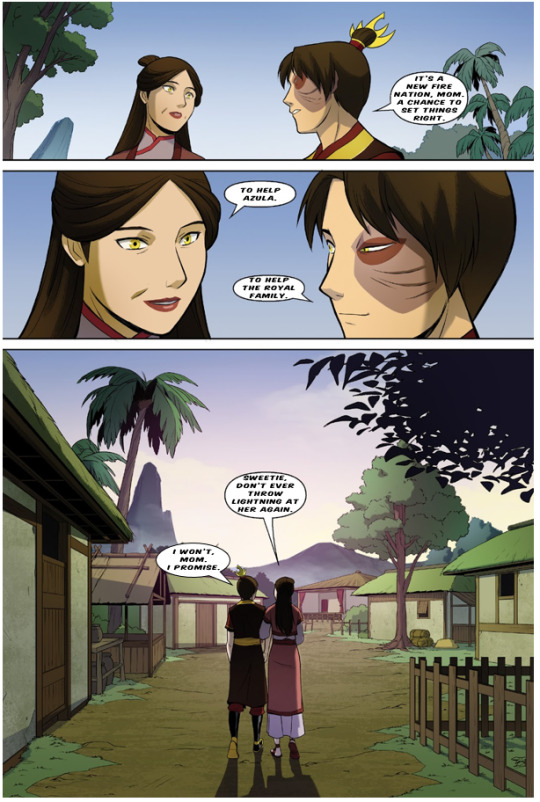
268 notes
·
View notes
Text
Modifying The Search - After the Soliloquy
Modifying The Search - Azula and Ty Lee
Modifying The Search - Azula’s Soliloquy
Some alternatives to the aftermath of Azula’s soliloquy.
Alternate #1: Enemies
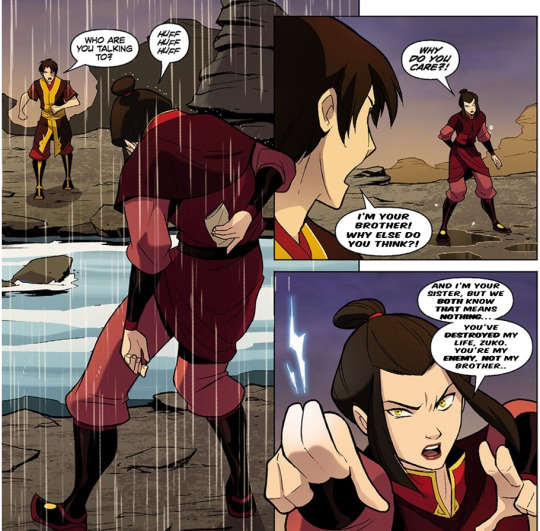
Alternate #2: Slander
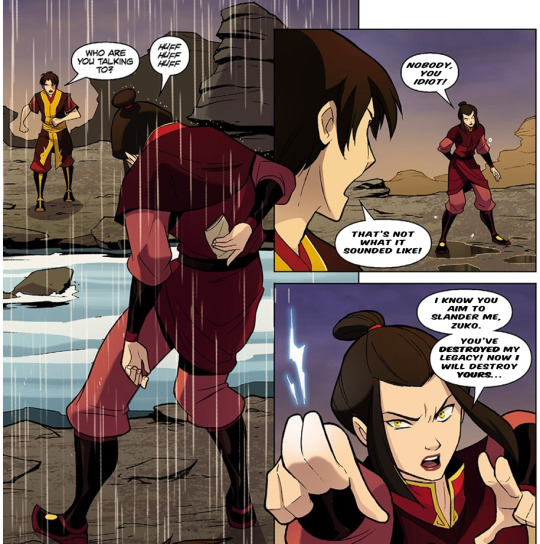
Alternate #3: Colonies

Alternate #4: Revenge

99 notes
·
View notes
Text
Modifying The Search - Azula’s Soliloquy
An alternative rendition of Azula’s soliloquy, one that provides better insight into her goals, motivations and asylum experience, and which ties into the Finale better.

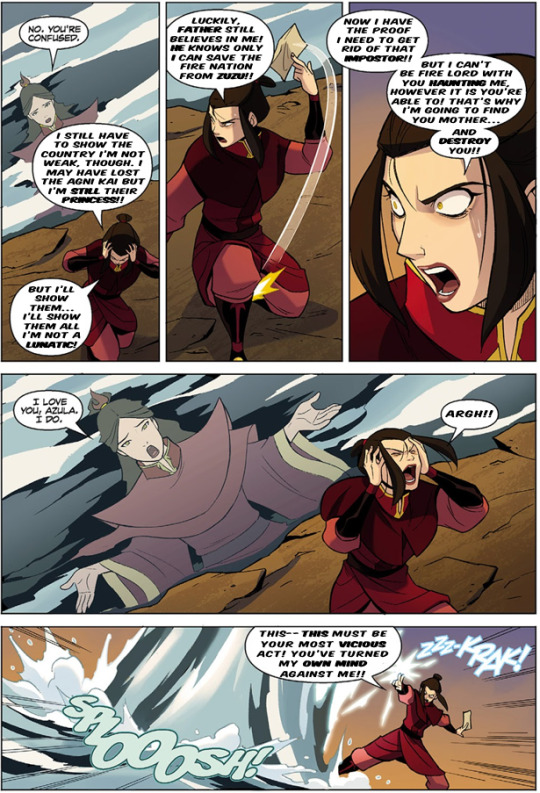
90 notes
·
View notes